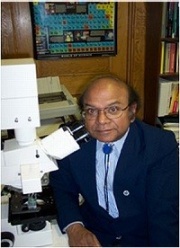Prasanta Mukhopadhyay (Muki)
Ph.D. Organic Maturation Studies (Jadavpur University, Calcutta, India)

Dr. Muki is currently the President of the Global Geoenergy Research Limited, Halifax, Nova Scotia, Canada. Since 2002, Muki has been nominated from the Senate of the HÂþ» University, Halifax, Nova Scotia, Canada as an Adjunct Professor at the Earth Sciences Department and since then he guided PhD and Masters Students at the HÂþ» University on various aspects low temperature organic geochemistry, organic petrology, and petroleum system modeling along with other professors. He has also been elected as a Professional Geoscientist of Nova Scotia.
He had a PhD Degree in Organic Maturation Studies from Jadavpur University, Calcutta, India and has worked for two years as Post-Doctoral as Humboldt Research Fellow in Petroleum Geochemistry at the Institute of Coal and Petroleum, RWTH, Aachen, NRW, Germany with Prof D. H. Welte.
Muki worked as a research scientist, geochemist and advisor in geochemistry/organic petrology and petroleum system modeling for Oil and Natural Gas Commission (ONGC) (Dehra Dun, India), Institute for Organic and Petroleum Geochemistry (ICH-5), Juelich & Aachen, Germany, The University of Texas at Austin, Austin, Texas (Texas Bureau of Economic Geology); Geofuel Research Incorporated associated with the Cape Breton University, Sydney, Nova Scotia, Canada), and Murphy Oil USA (Houston, Texas).
During the last 20 years, he is actively involved in multiphase research and evaluation of oil and gas prospect evaluations for both deep and ultra deepwater marine basin and shale oil/gas exploration for more than 100 oil and gas companies worldwide. This work includes research and interpretation of the geological, geophysical, geochemical/, and petroleum system modeling data and writing of research report for various oil companies, and universities throughout the world on both conventional and unconventional petroleum system research and development. During that time, He has published 71 articles and chapter in various books (AAPG, Developments in Sedimentology. etc). He edited four books for Elsevier Publication, John Wiley and American Chemical Society related to unconventional (Shale Gas, Shale Oil and CBM), conventional hydrocarbons explorations (shallow or deepwater) (including the book published by American Chemical Society).
Dr. Muki conducted many short and webinar courses for various oil companies and professional organizations in Brazil (for Petro Bras Research Center), Canada, China (Research Institute of Petroleum and Shengli Oilfield Research Center); India (ONGC); Japan (JAPEX and JNOC); Venezuela; and USA (AAPG annual conventions and other research short courses in Houston, Texas, various universities, and oil companies[Bass Petroleum, Hunt Oil, Chevron, Exxon, Anadarko, Husky Oil, etc.]) on the application of petroleum geochemistry and petroleum systems modeling for unconventional and conventional resource evaluations. He has presented numerous oral presentations at various professional and scientific society meetings worldwide. In November 2013, Dr. Muki was invited by the American Business Conference at the George Brown Convention Center, Houston, Texas to deliver a special presentation on Prospect Evaluation of GOM Ultra Deepwater Tertiary reservoirs based on heat flow, geochemistry, and petroleum system modeling. He was also on a panel on overpressure issues in the ultra deepwater Tertiary reservoirs.
In 2011, Dr. Muki received the âLifetime Achievement Awardâ or âHonorary Memberâ from the Society for Organic Petrology (TSOP), Washington, D.C. USA for his outstanding contribution in the Science of Organic Petrology and its relation to Petroleum Geochemistry. AAPG in 2013 in Houston, Texas honored Dr. Muki as Charles Taylor Fellow of the AAPG for his outstanding contribution for the AAPG Editorial Board for evaluating various scientific publications (book and bulletin). He has received several best paper awards on maturation, petroleum geochemistry and coalbed methane from various scientific societies and conferences. In 1998, Dr. Muki also received a citation from the Premier of Nova Scotia for his scientific achievements and his promotion for oil/gas and coal industries. In 2011, he received âAmbassador of Nova Scotiaâ from the Nova Scotia Department of Economic Development and the World Trade and Convention Centre, Halifax, Nova Scotia.
He has also organized special sessions for the AAPG Annual Conventions (2000-2010) on the application of maturation, geochemistry and basin modeling on unconventional shale gas/oil and deepwater petroleum exploration; the American Chemical Society (1993-1995) on maturity and petroleum geochemistry; TSOP on Shale Gas/Shale Oil, and other geochemical societies on geochemistry of shale issues (2009, 2010, and 2011).
He has published 71 articles and chapter in various books (AAPG, Developments in Sedimentology. etc). He edited four books for Elsevier Publication, and American Chemical Society related to unconventional (Shale Gas, Shale Oil and CBM), conventional hydrocarbon explorations (shallow and deepwater.
Dr. Mukhopadhyay also worked as the organic geochemist on board of the Global Challenger in Leg 87 (Nankai Trough, Japan) that lead to the discovery of Gas Hydrate in the Nankai Trough; Japan and also worked on the Mediterranean Sapropel on board of JOIDES Resolution on Leg 107 in the Tyrrhenian Sea.
Dr. Mukhopadhyay is an active member of AAPG, CSPG, and TSOP and currently serving as Member within the Member Society Council of the American Geological Institute (AGI). Since 2002, Dr. Mukhopadhyay has been the Associate Editor of the AAPG Bulletin and continuing until now. He has also elected as the President of TSOP during 2000-2001 and Vice-President during 1993-1994. He is also actively involved with AAPG Research Committee (2000-2005), Shale Gas/Shale Oil Committee (2007-2013), and Astrogeology Committee (2008-2013). Since 2004, Dr. Muki is an active member of the Astrobiology Working Group of NASA (USA) and conducting and published several publications on Mars and Solar System Hydrocarbons
